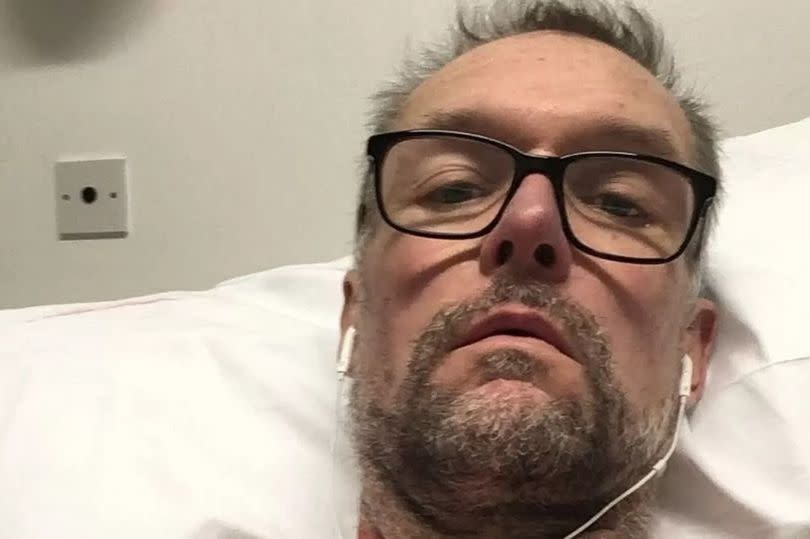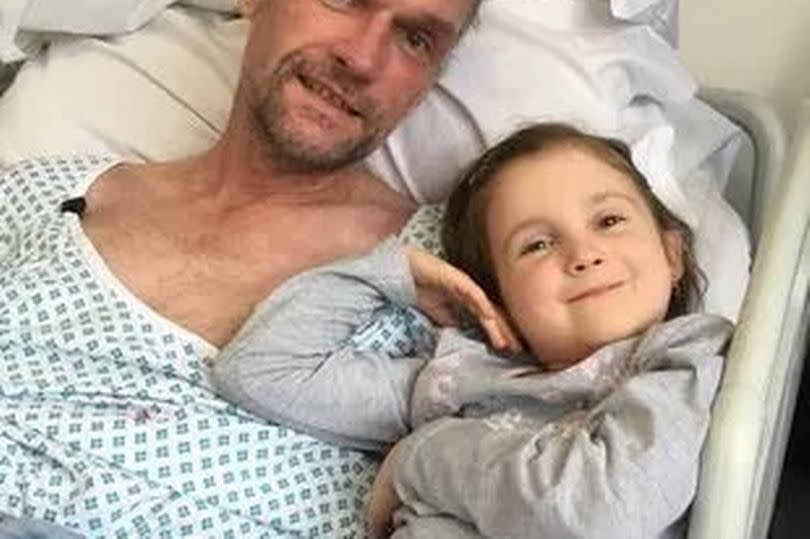'I thought I had vitamin B deficiency - it was actually a three in a million disease'

A dad who thought his symptoms were simply from a vitamin B deficiency was diagnosed with a "three in a million" disease.
Martin Williams, 52, lost 40kg in weight, began losing function in his legs, and gradually lost the ability to control his arms and hands. His symptoms because so severe that his wife, Elena, 44, had to feed him.
Initially, doctors believed Martin was suffering from a common vitamin B deficiency or Guillian-Barre syndrome - a rare and serious condition that affects nerves. However, two MRIs, a pet scan, and many blood tests later, the dad-of-two was diagnosed with POEMS syndrome - an incredibly rare plasma cell disorder.
Read more: As a harrowing video was shared among neighbours, they simply said: 'Jesus Christ'
Doctors treated Martin with five months of chemotherapy in an attempt to kill the two tumours causing the symptoms alongside a stem cell transplant. Fortunately, he is now able to stand and walk for the first time and has even started working again.
Martin, a supermarket worker from Newmarket, Suffolk, said: "I lost the ability to control my hands and arms. I couldn't feed or relieve myself. It was quite a dramatic decline. I needed 24/7 care.
"Each day I felt function leaving my body, to the point where I couldn't take a tissue of a box. My function was taken away from me and I didn't know how to get it back. It's miraculous what they did. They took my healthy blood cells and used them to replace the damaged ones. It's incredible.

"I managed to stand and walk for the first time in ages. In December I drove again using an automatic car." Martin first noticed something was wrong in February 2017.
He said: "I started to feel like my body was falling under me. I had problems walking. My toes went numb. I gradually lost function.
"I couldn't walk a few hundred yards. My leg seemed puffy. I was losing definition in my legs." Despite testing, doctors couldn't work out what was wrong with Martin.
He added: I didn't recover and I was admitted to hospital. I cut my hours down and had to stop working entirely in August 2017 because I couldn't function. I told my wife I was no longer safe to drive our car. I was sat at the dinner table and I said, 'it's happening to my hands'."
He continued: "The doctors found two tumours actively producing a harmful protein that was attacking my peripheral nervous system. The tumours were in two of my ribs. I had to get them removed. The diagnosis was a relief. They knew how to treat it. I was told the treatment would be five months of chemotherapy and a transplant.

"I wanted them to get on with it. As someone who's independent, who's been around the world, being fed and toileted by others was just humiliating. My terror was being reliant on 24/7 care for the rest of my life." Martin had the transplant in April 2018.
He said: "Before the transplant, I spoke to my friend and said: 'If I don't make it out of this alive, please look after my wife and kids'. My two girls were my biggest worry. My youngest was two years old at the time. There was a point where I didn't know if I was going to see her grow up beyond two."
Fortunately, Martin is now recovering and was even able to return to work in January 2019. He said: "I'm doing something now I wouldn't have done otherwise - and I'm actually quite good at it. My condition will never go away but it can be treated. I have annual blood tests. There's ongoing monitoring, but no medical treatment.
"I use ankle support, so I can walk short distances but not go on long walks. I also can't run or do sporting activities. It's difficult for me to lift heavy things up and I can't crouch down on the floor. My legs probably have 20% of the strength they should. We're going away in the summer but I'll have to use my mobility scooter for day trips.
"Even walking up slopes is difficult. But if I can do something I'll do it, if I can't, I don't mind asking for help".
What is POEMs syndrome?
According to cancer charity Myeloma UK, POEMS syndrome is a rare type of plasma cell disorder that can affect multiple systems in the body. It is named after the five common features of the syndrome:
Polyneuropathy – nerve damage
Organomegaly – enlargement of some organs
Endocrinopathy – abnormal function of endocrine glands
Monoclonal plasma cell disorder – such as myeloma or another plasma cell disorder
Skin changes - such as hyperpigmentation
Treatment for POEMS may include chemotherapy and/or radiotherapy.

 Yahoo News
Yahoo News 
